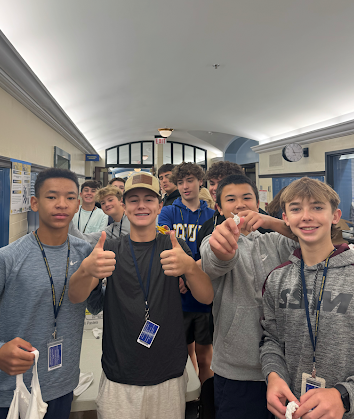As your sixth period approaches, you start to feel tired and want to go home and lay in bed. Or maybe it’s a sunny day and you want to tan outside instead of taking notes in your math class. Or maybe you have a test you’re unprepared for.
Whatever the reason may be, you’ve now convinced yourself you should go home, and the inevitable text is sent.
“Mom, can you sign me out?”
It’s no secret that students miss class throughout the school year, but according to The White House, ever since Covid-19, the rate of chronic absenteeism doubled from 15 percent to 30 percent from 2018 to 2022. Chronic absenteeism is defined as missing at least 10 percent of school days.
Dean of Students Laura Clegg has closely monitored attendance patterns this year, and has noticed a tremendous increase since Covid-19 at LFHS.
“Initially, I think we underestimated the impact that the social aspect of being in school provided students, but I think we can all agree that convenience of school from home is significantly outweighed by the enrichment received when students are in the classroom,” Clegg said.
In an anonymous Forest Scout survey of 200 students, 31 percent of students said they would not be signed out by their parents without a valid reason; however, 20 percent said they could be signed out whenever they wanted.
“I never make it through a full week of school. If I’m caught up on all my work, I usually ask my parents to sign me out of some of my classes, and then I just go home,” senior Adah Bodine said.
Each student is allowed nine parental accused absences per class, per semester. This allows students to miss class for appointments, sicknesses, or college visits.
75 percent of students said they miss class for appointments and sickness only. However, 20 percent of students said they miss class because they don’t feel like going.

At LFHS, each student is issued a MacBook containing all of their assignments, making school work easily accessible.
During the Covid-19 pandemic, students were forced to continue school work via Google Meet, and complete all assignments from home.
Since then, students have realized how doable schoolwork is from home, and are now less hesitant to miss class and complete their work on their own time. In fact, 58 percent of students said they rarely experience any stress from missing class.
“I do miss class a lot, but I’m able to keep up with my work and maintain my grades so I don’t usually worry about my attendance,” junior Bria Mancuso said.
While students who frequently miss class feel that their absences don’t hinder their learning, educators feel the opposite.
“School work from home is just not the same. They miss the opportunity to ask questions and challenge each other. These conversations are an enormous part of the learning process, not only when it comes to content, but also in terms of how to simply communicate with others,” Clegg said.








